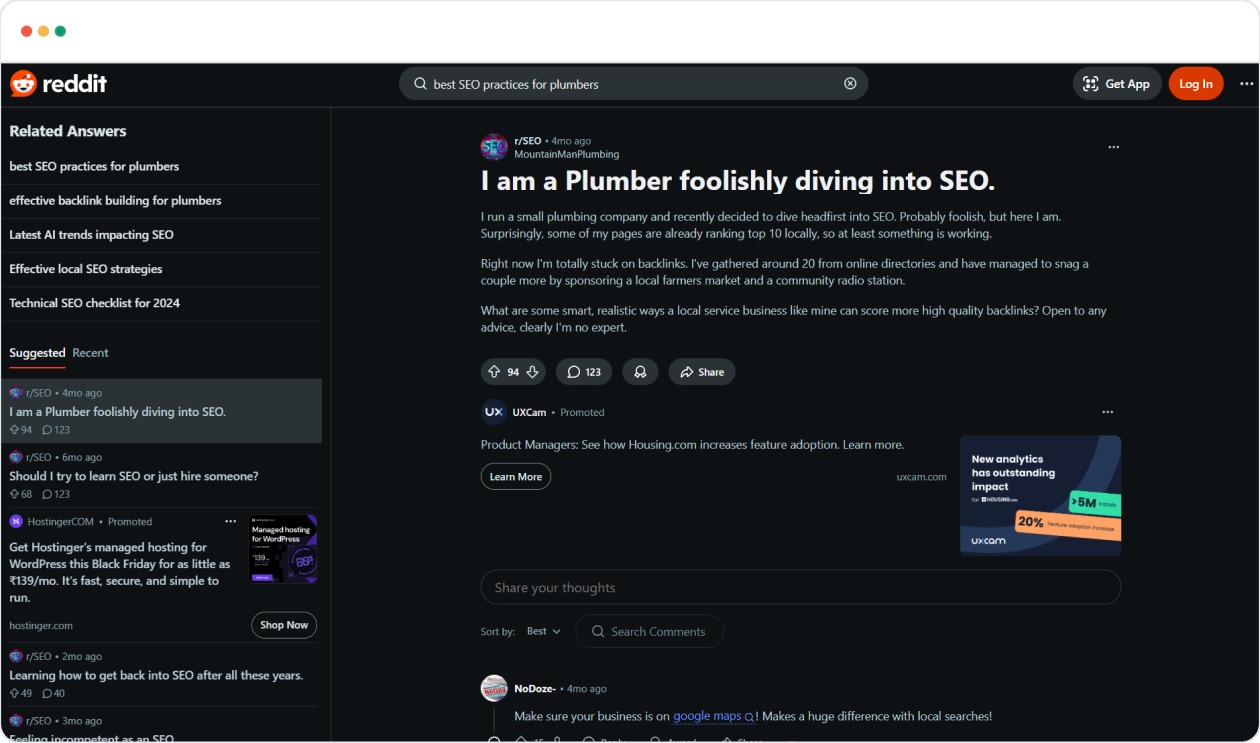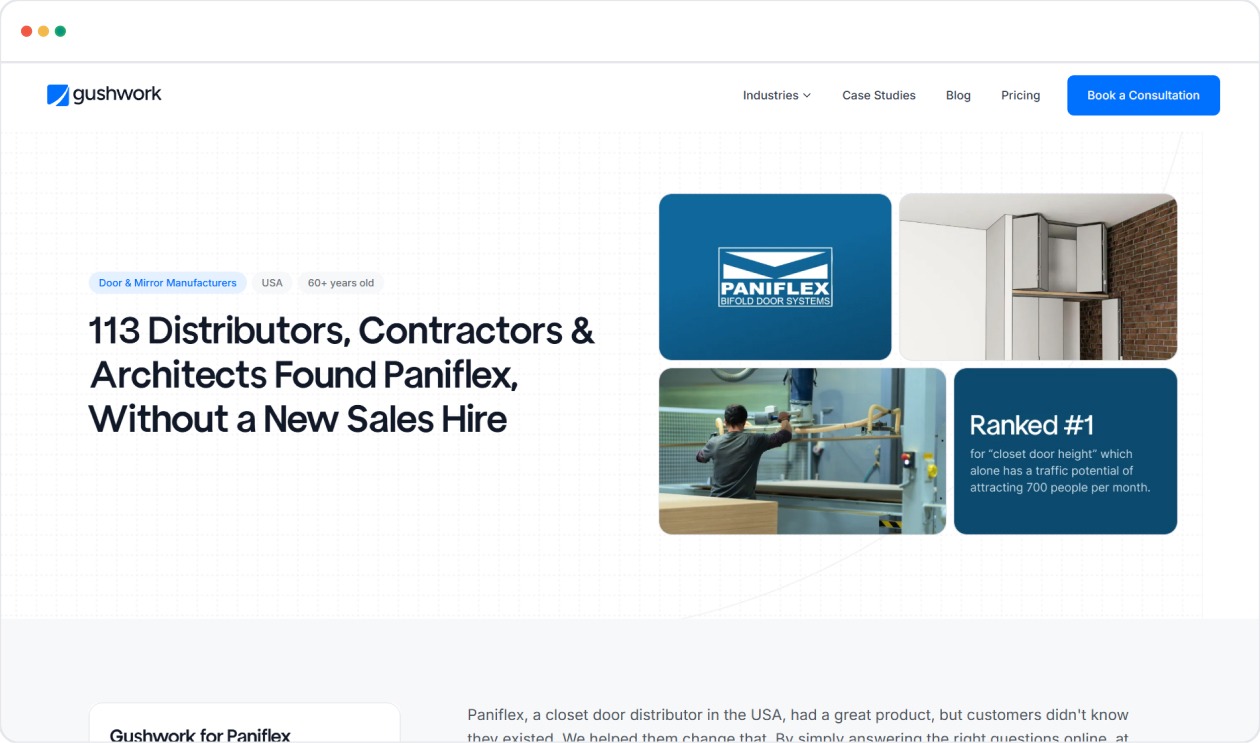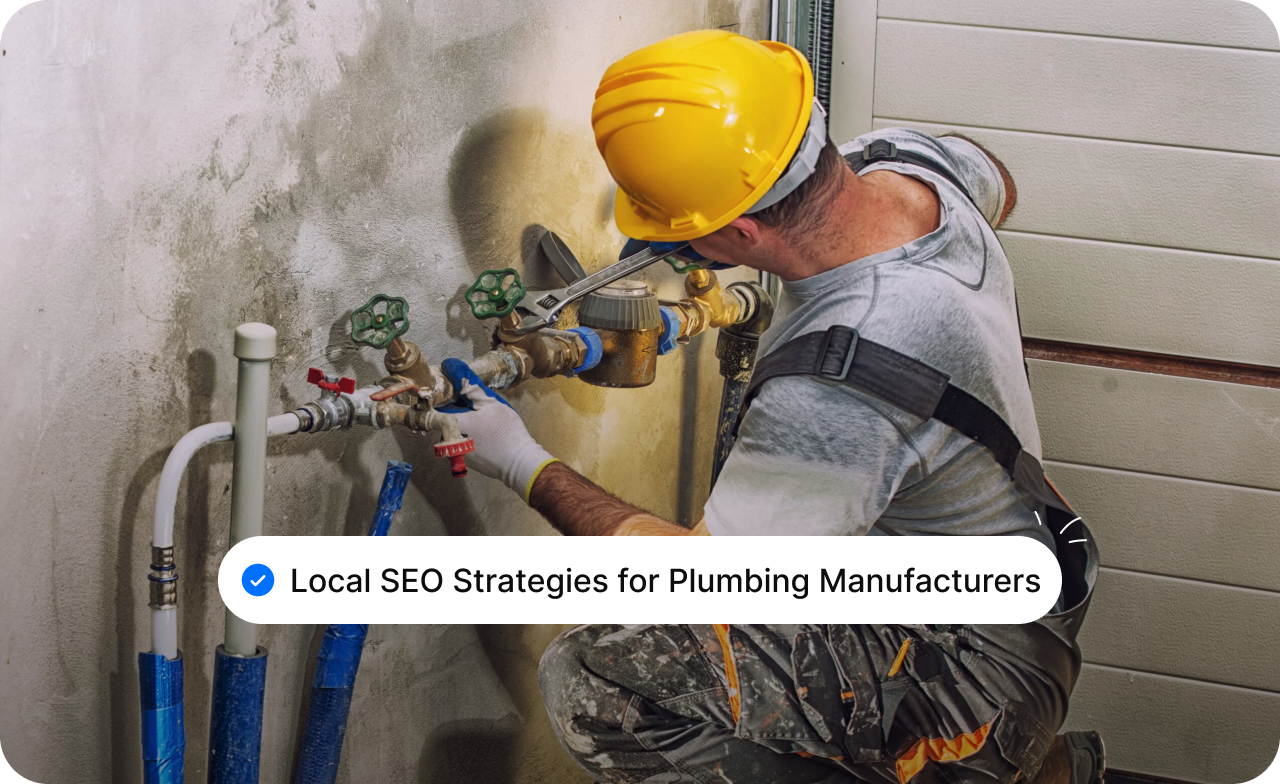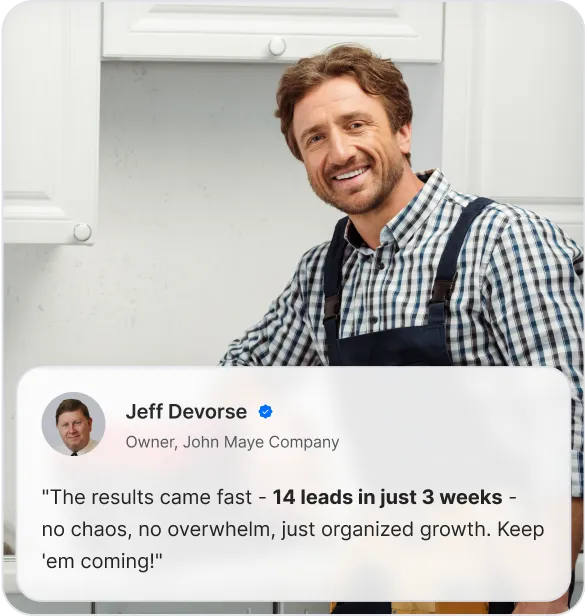You can be the best plumber in town, but without the right marketing, it’s easy to get overlooked amidst all the other options out there.
Many plumbers find themselves stuck, struggling to get a steady stream of work, no matter how skilled they are. Marketing without proper understanding makes you spend time and money on strategies that don’t deliver.
And with demand shifting up and down, and the constant pressure of competing with other local businesses, it’s clear that a more reliable system is needed.
This guide will help you understand how to build a plumbing marketing plan that attracts consistent, qualified leads and establishes trust in your brand. All while ensuring long-term growth, without wasting your valuable time or money.
What Is SEO and Why Is It a Must-Have for Plumbing Companies?
Think of Search Engine Optimization as the process of improving your digital storefront. It helps your products show up in search results when people search for things like plumbing fittings, pipes, or any other relevant terms..
Now, here’s where it gets really important for you: Local SEO. Since most of your customers are in specific areas, local SEO is what makes sure people searching for plumbing supplies in your city can actually find you. It helps to:
- Get Found Locally: Local SEO helps your business pop up when someone types “plumbing supplies near me” or “water heater parts in [city].”
- Target the Right Audience: Your customers are local, so you want to make sure you’re showing up for searches in your area. This leads to more qualified leads who are ready to buy.
- Stay Ahead of Competitors: A lot of businesses ignore local SEO, leaving you with the chance to be the go-to brand in your area and leave the competition behind.
By focusing on local SEO, you’re ensuring your plumbing products get in front of the right people at just the right time. It’s an easy way to get more visibility and more sales.
6 Essential SEO Strategies to Grow Sales for Plumbing Businesses
Implementing the right SEO strategies will help you connect with more qualified leads, improve visibility, and drive business growth, especially in your local market.
1. Local SEO: How to Rank for “Plumber Near Me” and More
Get Found Locally with Google Business Profile Optimization
You know how important it is for your plumbing products to be visible when local contractors or homeowners search for them.
By optimizing your Google Business Profile and making sure your business shows up on Google Maps, you’ll gain a serious competitive edge.

Here's how to make sure your local presence is strong:
- Consistency is Key: Double-check that your business name, address, and phone number (NAP) are consistent across all your online listings.
- Encourage Reviews: Reviews from distributors, contractors, and clients can seriously boost your profile, helping you look more trustworthy in local searches.
Location-Specific Keywords
Make sure you’re using the right local search terms that match how people in your area actually search for plumbing services. For example, instead of broad keywords, use targeted ones such as “emergency plumber in [City]”, “pipe repair near [Location]”, or “water heater installation in [Region]”.
To make this strategy work, you should:
- Add these local keywords to your service pages, meta titles, and meta descriptions.
- Create city-specific landing pages or blogs (e.g., “Top Plumbing Services in Dallas” or “How to Fix a Leaky Faucet in Austin”).
- Include your service areas naturally in your website copy, headings, and image alt text.
- Update your Google Business Profile with matching location keywords so your website and GBP reinforce each other.
This approach ensures your plumbing business appears in search results when nearby homeowners or businesses look for your specific services.
2. On-Page SEO: Make Your Website a Lead Magnet
Targeting Local Plumbing Keywords on Key Pages
When it comes to your website, make sure you're using local keywords on the important pages, like your homepage, product pages, and blogs. For example, include terms like “plumbing fittings in [City]” or “water heater parts near [Region]” in your content. This makes it easier for local customers to find you.
Optimizing for Mobile and User Experience
More people are searching on their phones than ever before, so if your website isn’t mobile-friendly or doesn’t load quickly, you’re losing valuable traffic.
Use tools like Google PageSpeed Insights to ensure your site is fast and responsive.
3. Content Marketing: Attract and Convert with Quality Content
Blogging for Plumbing Businesses: Answering the Tough Plumbing Questions
One of the best ways to attract visitors is by creating helpful content.
Use keywords that reflect how your local customers actually search for plumbing services. For example, focus on phrases like “plumber near [City]”, “24-hour plumbing service in [Area]”, or “bathroom pipe repair [Region]”.
To make the most of these keywords:
- Target them on key service pages such as pipe repair, drain cleaning, or water heater installation.
- Create separate pages for each major city or neighbourhood you serve to rank in multiple locations.
- Write helpful blog posts answering local search intents—like maintenance tips, seasonal plumbing issues, or cost breakdowns for services in your region.
- Update your website’s on-page SEO (headings, URLs, meta tags) to match these localized terms.
This approach helps your plumbing business rank higher for searches that directly convert—people actively looking for a plumber in your area.
Using Educational Video Content to Engage Visitors
Videos are a great way to keep customers engaged. Think about creating product tutorials, installation guides, or even a factory tour video.
Embedding these on your product pages can lower your bounce rate and improve your SEO rankings.
4. Technical SEO: The Backbone of a Strong SEO Strategy
Optimizing Your Site Structure
Make sure your website is easy to navigate, with clear categories for your products.
A simple, organized structure makes it easier for users to find what they need, and helps search engines crawl your site more efficiently.
Implementing structured data (Schema Markup) can help search engines better understand your plumbing website’s content, allowing key details like service type, ratings, pricing, and operating hours to appear directly in search results.
This makes your service pages stand out and improves visibility in local searches and boosts click-through rates.
5. Link Building: Establish Your Authority in the Plumbing Industry
Building High-Quality Backlinks
Getting backlinks from plumbing associations, contractors, and other industry websites is crucial. Backlinks from reputable sites like plumbing suppliers or home improvement blogs can increase your authority and boost your SEO.
Creating Shareable Content for Link Building
Write content that others want to share. This could be articles, infographics, or case studies about plumbing trends or common issues. The more shareable your content, the more backlinks you’ll earn.
In a Reddit Thread, a small plumbing company owner shares their journey into SEO, highlighting challenges like acquiring quality backlinks and the impact of local SEO on rankings.

Gushwork specializes in addressing these issues by implementing AI-assisted SEO strategies tailored for local service businesses. Our approach has helped clients achieve significant improvements in search engine rankings and online visibility.
6. Tracking & Measuring SEO Success for Plumbing Businesses
Using Google Analytics & Google Search Console
To see how your SEO efforts are paying off, use Google Analytics and Google Search Console to track important metrics like organic traffic growth, keyword rankings, and conversion rates.
Setting up custom goals allows you to measure how many leads or orders you're getting through organic search.
How to Keep Your SEO Strategy Up-to-Date: A Practical Guide for Plumbing Businesses
It’s extremely important for businesses to continuously optimize their SEO strategies.
Here’s how you can keep your SEO efforts relevant, effective, and aligned with the latest trends:
1. Stay Informed About Algorithm Updates
Search engines like Google frequently update their algorithms, which can impact your website's ranking. To stay ahead of these changes:
- Follow SEO blogs such as Moz, Search Engine Journal, and Neil Patel’s blog to get the latest news.
- Use tools like SEMrush to monitor updates and adjust your strategy, ensuring that your site is always in line with best practices.
2. Perform Regular SEO Audits
SEO isn’t a one-time task; it requires ongoing attention. Conduct SEO audits every 3 to 6 months to assess your site’s performance and identify areas for improvement:
- Use Google Search Console to check for crawling issues and site errors.
- Ensure that your site’s speed and mobile optimization are top-notch, as these factors heavily influence rankings and user experience.
3. Refresh Your Content Regularly
Outdated content can harm your SEO rankings. Keep your website fresh and relevant by:
- Updating older blog posts and service pages with new keywords, information, and industry trends.
- Ensure your content addresses the most recent pain points and needs of your target audience, making it more valuable to them.
4. Optimize for New SEO Trends
SEO trends are always evolving. Some important areas to focus on:
- Voice Search: With more people using smart speakers and mobile devices for search, optimize for conversational queries and long-tail keywords. Tools like Google Trends allow you to monitor how often specific search terms are entered into Google over time.
While it cannot directly isolate voice-search traffic, you can use it to identify rising interest in conversational, question-based queries (which often correspond to voice searches), giving you indirect insight into voice-search trends.
- Featured Snippets: Structure your content to target position zero (the top spot in search results) by answering questions clearly and concisely.
Case Study: Paniflex – Attracting 113 Qualified Buyers Without Adding a New Sales Hire

Paniflex, a closet door distributor in the USA, had a great product but faced a critical challenge: their potential customers couldn’t find them.
Despite their quality offerings, they were invisible online, missing out on significant business opportunities.
Gushwork stepped in to help them shift their SEO strategy. We focused on providing the right information at the right time, helping Paniflex answer technical questions that potential buyers were searching for.
This approach included creating valuable resources like product specifications, installation guides, and technical details that architects, contractors, and designers needed for their projects.
The results were remarkable:
- 113 new qualified buyers found Paniflex in just 6 months.
- Paniflex began ranking for 25+ high-competition keywords, beating their competitors.
- They built lasting search authority, with resources that continued to attract high-intent buyers long after they were published.
This strategy didn’t just bring more traffic; it changed the way Paniflex did business. Sales calls became more productive, as customers were already knowledgeable about the products.
Additionally, Paniflex's competitors struggled to match the technical depth and expertise that Paniflex offered, allowing them to charge more for their products and solidify their position as a trusted expert.
This case study demonstrates how a well-executed SEO strategy can generate high-quality leads without the need for additional sales hires, providing a sustainable long-term advantage.
Start Implementing These SEO Strategies Today
As you now know that simply relying on basic SEO tactics will not help. To truly dominate local searches and drive qualified leads, you need a strategic, long-term approach.
By optimizing for local SEO, refreshing your content, and focusing on technical SEO, you can ensure your business shows up when it matters most.
FAQs
Q1. How can plumbing improve their SEO rankings?
A1. Focusing on SEO is crucial for plumbing. Optimizing your Google Business Profile (GBP) is a key strategy. Ensure your business name, address, and phone number (NAP) are consistent across all online platforms.
Encourage satisfied customers to leave positive reviews, as this can significantly boost your local search rankings. Additionally, creating location-specific content and obtaining backlinks from local businesses can further enhance your SEO efforts.
Q2. What are some effective SEO strategies for plumbing?
A2. Effective SEO strategies for plumbing include:
- Keyword Research: Identify high-intent, location-specific keywords that potential customers are searching for.
- On-Page Optimization: Optimize your website's content, meta tags, and images to align with targeted keywords.
- Content Creation: Develop informative content that addresses common plumbing issues and solutions, positioning your brand as an industry authority.
- Backlink Building: Acquire high-quality backlinks from reputable websites to improve domain authority.
- Technical SEO: Ensure your website is mobile-friendly, has fast loading times, and is free from technical errors.
Q3. How can plumbing businesses attract more qualified leads through SEO?
A3. To attract more qualified leads, plumbing businesses should:
- Optimize for Long-Tail Keywords: Target specific, less competitive keywords that potential customers are likely to search for.
- Create Service-Specific Landing Pages: Develop dedicated pages for each product or service offered, providing detailed information to visitors.
- Implement Clear Calls-to-Action (CTAs): Encourage visitors to take desired actions, such as requesting a quote or contacting your sales team.
- Utilize Local Directories: List your business in local online directories to increase visibility and credibility.
Q4. What role do reviews play in SEO for plumbing businesses?
A4. Reviews play a significant role in local SEO. Positive reviews on platforms like Google My Business can improve your business's visibility in local search results. They also build trust with potential customers, influencing their decision-making process.
Encouraging satisfied clients to leave reviews and responding to them promptly can enhance your online reputation and SEO performance.
Q5. How can plumbing businesses build backlinks to improve SEO?
A5. Building backlinks involves acquiring links from other reputable websites to your own. For plumbing companies, effective strategies include:
- Guest Blogging: Write informative articles for industry-related blogs and include links back to your website.
- Partnerships: Collaborate with related businesses, such as construction companies, to exchange backlinks.
- Local Sponsorships: Sponsor local events or organizations and request a backlink on their websites.
- Directory Listings: Ensure your business is listed in relevant online directories with a link to your website.
Q6. What are some common SEO mistakes plumbing companies should avoid?
A6. Common SEO mistakes to avoid include:
- Neglecting Mobile Optimization: With increasing mobile searches, ensure your website is mobile-friendly.
- Ignoring Local SEO: Focusing solely on national SEO can lead to missed opportunities in local markets.
- Overlooking Technical SEO: Failing to address issues like slow loading times and broken links can negatively impact user experience and rankings.
- Keyword Stuffing: Overusing keywords can lead to penalties from search engines; focus on natural, high-quality content.
Q7. How long does it take to see results from SEO efforts?
A7. SEO is a long-term strategy, and results can vary based on factors such as competition and the effectiveness of your efforts. Generally, it can take 3 to 6 months to start seeing noticeable improvements in rankings and traffic. Consistency in implementing SEO best practices and patience are key to achieving sustainable results.





















.webp)








.webp)
.svg)


.svg)
.svg)
.svg)




.svg)





.svg)